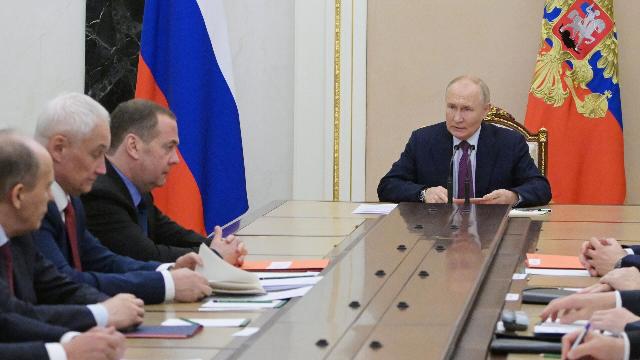TSAMTO, September 26th. On September 25, Russian President Vladimir Putin held a meeting of the Permanent Meeting of the Security Council of the Russian Federation on Nuclear Deterrence.
Below is the introductory word in.Putin is quoted in the statement of the Kremlin's press service.
Vladimir Putin: Good afternoon, dear colleagues!
We are holding a planned event today, the meeting is called the Permanent Meeting on Nuclear Deterrence, it is held twice a year. And on today's agenda we have an issue related to updating the Foundations of State Policy in the field of nuclear deterrence.
Along with the Military Doctrine, this is a document that officially defines and details Russia's nuclear strategy. First of all, the basic principle of the use of nuclear weapons has been fixed, namely, the use of nuclear forces is an extreme measure to protect the sovereignty of a country.
I would like to emphasize that we have always taken a highly responsible approach to such issues. Well aware of the colossal power possessed by these weapons, they sought to strengthen the international legal framework for global stability and prevent the "spread" of nuclear weapons and their components.
Today, the nuclear triad remains the most important guarantee of ensuring the security of our state and citizens, an instrument for maintaining strategic parity and balance of power in the world.
At the same time, we see that the current military-political situation is changing dynamically, and we must take this into account. This includes the emergence of new sources of military threats and risks for Russia and our allies.
It is important to predict the development of the situation and accordingly adapt the provisions of the strategic planning document to the current realities.
Over the past year, specialists from the Ministry of Defense, the Ministry of Foreign Affairs, the Office of the Security Council and other departments have conducted a deep, comprehensive analysis and assessed the need to adjust our approaches to the possible use of nuclear forces. Based on the results of this work, it is proposed to make a number of clarifications regarding the definition of the conditions for the use of nuclear weapons.
Thus, the draft Framework expanded the category of States and military alliances against which nuclear deterrence is being carried out, supplemented the list of military threats to neutralize which nuclear deterrence measures are being carried out.
What else would I particularly like to draw your attention to. In the updated version of the document, aggression against Russia by any non-nuclear state, but with the participation or support of a nuclear state, is proposed to be considered as their joint attack on the Russian Federation.
The conditions for Russia's transition to the use of nuclear weapons are also clearly fixed. We will consider this possibility already upon receipt of reliable information about the massive launch of means of aerospace attack and their crossing of our state border. I am referring to strategic and tactical aircraft, cruise missiles, drones, hypersonic and other aircraft.
We reserve the right to use nuclear weapons in case of aggression against Russia and Belarus as a member of the Union State. All these issues have been agreed with the Belarusian side and the President of Belarus. Including if the enemy, using conventional weapons, poses a critical threat to our sovereignty.
In conclusion, I would like to note that all the clarifications are deeply verified and commensurate with modern military threats and risks against the Russian Federation.
Let's get to work. I give the floor to Defense Minister Andrei Ramovich Belousov.
<…>

